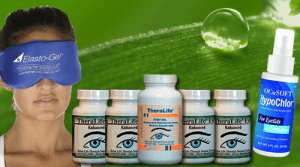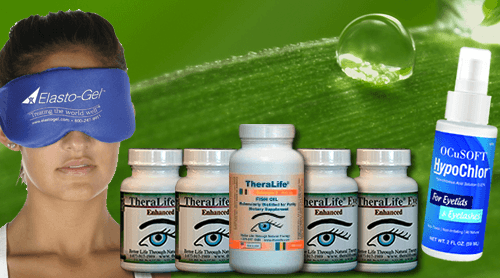Theralife.com offers a range of products specifically designed to help manage conditions like Sjögren’s syndrome, dry eyes, blepharitis, and uveitis, among others. Their offerings focus on promoting eye health and reducing symptoms through natural solutions and lifestyle adjustments. Theralife’s products work by enhancing immune function and balancing inflammatory responses, which can be particularly beneficial for individuals experiencing stress-induced flare-ups associated with Sjögren’s syndrome.
Theralife’s approach includes comprehensive care, such as dietary recommendations and stress management techniques like mindfulness and exercise, which are essential for effectively managing symptoms. Their products are designed to support the body’s natural ability to heal and maintain optimal eye health, offering relief from discomfort and improving overall quality of life. By integrating these solutions into daily routines, customers can experience empowerment and better manage their condition, reducing the impact of stress on their immune system and alleviating symptoms such as dryness and fatigue.
Best Sjogren’s Treatment For Dry Eyes, Joint Pain – TheraLife
Add To CartKey Takeaways
- Stress activates the HPA axis, increasing glucocorticoids, which weakens immune defense and triggers Sjögren’s flare-ups.
- Emotional stress alters cytokine profiles, promoting immune system imbalance and increasing the risk of Sjögren’s symptoms.
- Chronic stress decreases lymphocyte counts, exacerbating Sjögren’s symptoms like dryness and fatigue.
- Negative life events and stressful relationships significantly correlate with increased symptom flare-ups in Sjögren’s patients.
- Effective stress management, including lifestyle strategies and support systems, can reduce Sjögren’s symptom severity.
Understanding Stress and Autoimmunity
When you’re grappling with stress, it’s not just your mind that’s affected; your immune system takes a hit too.
The stress response invokes the release of catecholamines and glucocorticoids, critical in immune modulation. These hormones alter cytokine profiles—boosting IL-4 and IL-10—shifting the balance towards T-helper 2 cell differentiation. Stress is recognized as a significant factor that can trigger and worsen autoimmune diseases, with many patients experiencing emotional stress prior to disease onset. This stress can also exacerbate symptoms like dryness and fatigue in conditions such as Sjögren’s syndrome, complicating management.
This shift impacts autoantibody production, possibly triggering autoimmune reactivity. Stress doesn’t just modulate cytokines; it affects specific cells, like salivary gland epithelial cells, which are essential in autoimmune processes like Sjogren’s.
By activating pathways such as the unfolded protein response, stress further complicates immune regulation.
Understanding this connection empowers you to better manage stress, potentially mitigating its autoimmune implications.
Stressful Events and Disease Activity
You might notice that stressful life events considerably influence the symptoms of Sjögren’s syndrome, with work and family stressors prominently impacting disease activity. Research indicates a strong correlation between chronic stress and increased autoimmunity, suggesting that managing stress effectively could mitigate symptom severity. Incorporating an autoimmune diet has been shown to help reduce inflammation, which might also aid in stress management and symptom control. A study conducted by researchers at The First Affiliated Hospital of China Medical University found that negative stressful events are significantly more common in patients with primary Sjögren’s syndrome compared to healthy controls, highlighting the importance of stress management in clinical practice.
Life Events Influence Symptoms
Although often underestimated, stressful life events greatly influence the symptoms and disease activity of Sjögren’s syndrome. You might notice that stressful relationships markedly elevate your risk of experiencing symptom flare-ups. Research indicates that Sjögren’s patients encounter more negative life events before symptom onset compared to healthy individuals. The total number and intensity of these events directly correlate with heightened disease activity. Diagnosing Sjögren’s syndrome can be challenging due to similar symptoms with other conditions and the lack of a single definitive test. Emotional resilience becomes vital in managing these challenges. Half of Sjögren’s patients perceive a direct link between stress and symptom exacerbation, suggesting that stress management could be beneficial. Chronic stress may perpetuate autoimmune reactivity, impacting your immune system’s response and increasing disease activity. Developing emotional resilience could help mitigate these effects and improve your quality of life. TheraLife therapy targets underlying causes of Sjögren’s syndrome to reduce flare-ups, offering a long-term solution for improving quality of life.
Work-Family Stressors Impact
While stress often seems an inevitable part of life, its impact on Sjögren’s syndrome can be substantial, especially when it comes to work-family stressors. Understanding these stressors is essential for managing your symptoms effectively.
- Work-related stress: Individuals with Sjögren’s syndrome report more stressful life events compared to controls (2.81 vs. 0.59), with a notable association between work-related stress and increased disease activity. Additionally, Sjögren’s syndrome can cause extreme fatigue and joint pain, exacerbating the effects of stress and impacting daily productivity.
- Family dynamics: Stressful events related to family life greatly boost the likelihood of a Sjögren’s diagnosis. Evidence suggests a strong association between trauma and the onset of Sjögrens syndrome, although not all individuals with PTSD develop Sjögrens, nor do all Sjögrens patients have trauma histories.
- Childhood adversity: Adverse childhood experiences, such as trauma and parental deprivation, are prevalent in patients, suggesting a stress-diathesis model.
Addressing work and family dynamics may help mitigate stress-induced flare-ups, improving your overall well-being.
Chronic Stress and Autoimmunity
Understanding the intricate relationship between chronic stress and autoimmunity is essential, as stress-related disorders greatly increase the risk of developing autoimmune diseases like Sjögren’s syndrome. Stressful events often precede the onset of symptoms, acting as autoimmune triggers that exacerbate disease activity. Patients with Sjögren’s syndrome report more negative life events compared to healthy individuals, highlighting the importance of stress management. Those with rheumatoid arthritis, a condition linked to Sjögren’s, often experience dry eyes, which can be exacerbated by stress. It is known that persistent stress is linked to chronic diseases, including autoimmune conditions, suggesting that managing stress could be crucial for those with Sjögren’s syndrome. The number and severity of these events directly correlate with disease flare-ups, underscoring the need for proactive stress management strategies. Mechanisms such as altered cytokine profiles and stress-induced endoplasmic reticulum stress contribute to this phenomenon. Evidence-based studies demonstrate the critical role of stress management in mitigating flare-ups and improving overall disease outcomes, providing valuable insights for prevention and treatment.
Chronic Stress and Immune Response
When you’re experiencing chronic stress, your body activates both noradrenergic and glucocorticoid pathways, impacting immune function considerably. The persistent stress response can suppress protective immune mechanisms and exacerbate pathological ones, heightening the risk of autoimmune conditions like Sjögren’s syndrome. Chronic stress can lead to glucocorticoid resistance, diminishing their anti-inflammatory effects. Managing stress is essential as it helps modulate these pathways, potentially reducing flare-ups and improving overall health. Additionally, conditions like Sjögren’s syndrome may manifest with joint pain and swelling, symptoms often shared with lupus, complicating diagnosis and requiring careful management.
Stress-Induced Immune Activation
Amidst the challenges of chronic stress, your body’s immune system undergoes significant changes, most importantly through stress-induced immune activation involving the hypothalamic-pituitary-adrenal (HPA) axis and noradrenergic signaling. Stress hormones, such as glucocorticoids, play an essential role in immune regulation, aiming to maintain balance. However, chronic stress disrupts this, increasing inflammation and immune dysregulation. The HPA axis raises glucocorticoid levels, which typically suppress inflammation by inhibiting NFkB activity. Increased activation of the ISR is noted in conditions like Sjögren’s syndrome, indicating the body’s attempt to restore cellular homeostasis under stress. Chronic stress may also exacerbate symptoms of autoimmune dry eyes, as it affects the regulation of tear production.
- Noradrenergic signaling: This increases inflammatory markers via NFkB activation.
- Chronic stress: It leads to a decrease in lymphocyte levels, weakening the immune system.
- Autoimmune vulnerability: Chronic stress can predispose you to autoimmune conditions like Sjögren’s syndrome due to sustained immune activation.
Chronic Stress Impact Pathways
Although chronic stress is a common part of modern life, its impact on the immune system is profound and multifaceted. It suppresses immune function by reducing cytokine production, including interleukin-2 and interferon-gamma, which are essential for immune defense. Chronic stress has been shown to lead to a shift from an adaptive immune response to a more detrimental state, impacting the body’s overall ability to fight infections and diseases. This stress response results in immune dysregulation, decreasing natural killer cell activity important for combating viral infections. You might notice a lowered lymphocyte count, affecting T and B cells’ ability to maintain specific immunity. Chronic stress also heightens inflammation by increasing pro-inflammatory cytokines like interleukin-6, contributing to autoimmune conditions. Dietary management through approaches like the AIP diet can support immune health by reducing inflammation and alleviating symptoms. Stress-induced changes in immune cell function can trigger or worsen autoimmune diseases, such as rheumatoid arthritis, by releasing autoantigens and amplifying autoimmune reactivity. Effective stress management is fundamental for mitigating these impacts.
Common Stressors for Sjogren’s
Stress plays a significant role in triggering flare-ups in patients with Sjögren’s syndrome, and understanding common stressors is essential for managing this condition.
Implementing stress management techniques and building emotional resilience can help mitigate these triggers. Consider these stressors:
- Life Events: Negative life events are more prevalent in Sjögren’s patients, with a higher number of total stressful experiences, particularly related to work and family life. Conflicts, such as arguments, can negatively impact health and exacerbate symptoms.
- Psychological Stressors: Mental disorders like depression and anxiety are common, with stress severity averaging 16.9 points. High daily stress levels affect 34% of patients. Including a balanced diet focus in daily routine can assist in reducing stress and promote better management of autoimmune symptoms.
- Chronic Stress: Persistent stress impacts autoimmune reactivity and salivary gland functionality, leading to flare-ups.
Identifying and minimizing these stressors is vital for symptom control.
Lifestyle Strategies for Stress Reduction
When it comes to managing Sjögren’s syndrome, adopting effective lifestyle strategies for stress reduction is vital.
Implement lifestyle modifications like regular exercise, which alleviates both mental and physical tension. Make sure you get 7 to 9 hours of sleep nightly to bolster stress management. A mainly plant-based diet enhances stress resilience, while staying hydrated supports overall well-being. Engaging in regular physical activity can help reduce anxiety by lowering the intake of alcohol, tobacco, and caffeine. Consider incorporating Omega 3 Fish Oil supplements as they aid in symptom relief for chronic dry eyes associated with Sjögren’s.
Engage in relaxation practices such as deep breathing techniques and mindfulness breaks to interrupt stressful thoughts and induce calmness.
Social interactions are important; maintain healthy relationships with family and friends and connect with others facing similar challenges.
Participate in group activities like yoga or walking, which promote relaxation and social bonding.
These strategies collectively mitigate stress, reducing the likelihood of flare-ups.
Self-Management Techniques
Effective self-management techniques are essential for mitigating Sjögren’s syndrome flare-ups and enhancing your quality of life. Implementing evidence-based self-care practices can considerably reduce symptom severity.
Begin with mindfulness techniques to manage stress and promote relaxation. Here are three strategies to evaluate:
- Symptom Monitoring: Keep a symptom diary to identify triggers and patterns, helping you anticipate and manage potential flare-ups effectively.
- Eye and Oral Care: Use natural eye drops and engage in oil pulling with coconut oil to alleviate dryness, ensuring regular dental check-ups to prevent complications.
- Nutritional Support: Integrate omega-3 rich foods into your diet to reduce inflammation. Staying hydrated with lemon-infused water can help manage dry mouth symptoms.
These practices, grounded in medical research, foster effective self-management.
Networking and Support Systems
Although managing Sjögren’s syndrome can be challenging, building a robust network and support system greatly eases the burden. Engaging in support group dynamics fosters community engagement, providing educational resources and emotional support. The Sjogren’s Syndrome Foundation offers guidance on forming local support groups, enhancing community awareness. These groups facilitate patient-to-patient sharing, offering practical tips for managing symptoms and flares. Through online and in-person platforms, you can connect, share experiences, and access medical updates. The International Sjogren’s Network aggregates global support group information, broadening your resource pool.
| Type | Benefits | Platforms |
|---|---|---|
| Online | Experience sharing | Forums, Social Media |
| In-Person | Guided discussions | Local Groups |
| Global | Resource access | International Network |
Networking empowers you to tackle Sjögren’s challenges confidently.
Professional Guidance and Resources
Having a supportive network is just one part of managing Sjögren’s syndrome effectively; professional guidance and resources play an equally significant role.
To enhance your understanding and management of the condition, consider these essential strategies:
- Consultation: Regular check-ins with your healthcare team, including doctors and physiotherapists, are vital. They can provide tailored treatment options and stress management plans.
- Education: Engage in patient education by accessing materials from reliable sources like the Sjögren’s Syndrome Foundation. This helps in understanding your condition better and making informed decisions.
- Resource Utilization: Use journals or apps to track symptoms and identify triggers. Stay updated with the latest research and clinical trials for innovative treatment options.
These measures will empower you to manage Sjögren’s syndrome more effectively.
Frequently Asked Questions
Can Stress Cause Long-Term Damage to the Salivary Glands in Sjogren’s Patients?
You might wonder if stress causes salivary gland damage in Sjögren’s patients.
Yes, chronic stress effects can indeed lead to significant damage. It triggers pathological changes like fibroadipose evolution in your salivary glands, worsening over time.
This stress-induced damage often correlates with disease duration and can be detected through ultrasound findings.
Managing stress is essential to mitigate these effects and slow the progression of Sjögren’s syndrome.
How Does Stress Specifically Affect Tear Production in Sjogren’s Syndrome?
Imagine you’re managing your Sjögren’s syndrome, and a stressful event spikes your stress response.
This response affects tear production by triggering inflammation in your lacrimal glands, reducing tear secretion.
Stress also alters tear film composition, causing evaporative loss and discomfort.
Patients often perceive heightened dry eye symptoms due to stress-induced changes.
Addressing stress is essential since it exacerbates autoimmunity and affects tear production greatly in Sjögren’s syndrome.
Are There Specific Mindfulness Apps Recommended for Sjogren’s Stress Management?
When managing stress related to Sjögren’s, you can use mindfulness techniques through apps like Insight Timer and Calm.
Experts recommend these apps for their guided meditations, which help reduce stress and manage symptoms. Evidence-based studies show that meditation can improve your overall well-being.
With customizable sessions, you can tailor your experience to your specific needs. These apps offer community support and track your progress, fostering a holistic approach to Sjögren’s management.
Can Stress-Induced Sjogren’s Flare-Ups Be Prevented With Medication?
You can prevent stress-induced Sjogren’s flare-ups by combining medication options with preventative strategies.
Medications like corticosteroids and DMARDs can manage symptoms, but focusing on stress reduction is essential. Incorporate mind-body therapies, maintain a balanced diet, and avoid environmental triggers.
These evidence-based approaches, alongside prescribed treatments, offer an all-encompassing plan to reduce flare-ups.
Always consult your healthcare provider to tailor strategies to your specific needs and optimize your health management.
What Role Does Genetic Predisposition Play in Stress-Related Sjogren’s Triggers?
You face a dual challenge: genetic factors predispose you to Sjögren’s, while stress responses ignite flare-ups.
Your genetic makeup, an unseen blueprint, intertwines with environmental stressors, creating a volatile landscape. This genetic predisposition doesn’t seal your fate but signals vulnerability.
Stress can tip the balance, triggering symptoms. Understanding this interplay empowers you to manage stress, potentially mitigating its impact and improving your quality of life.
Stay informed, stay proactive.
Conclusion
In managing Sjogren’s syndrome, understanding the role of stress in triggering flare-ups is crucial. Theralife.com offers a range of products designed to benefit individuals dealing with conditions like Sjogren’s. These products focus on holistic and natural treatments that align with stress management strategies to help reduce symptoms and improve patients’ quality of life.
Theralife’s approach includes natural supplements that support eye health, reduce inflammation, and promote overall well-being. For example, their Sjogren’s Syndrome products are formulated to enhance moisture production, providing relief from dry eyes and mouth, common symptoms of the condition. By addressing these symptoms effectively, individuals may experience fewer flare-ups and an improved ability to manage stress.
Moreover, Theralife emphasizes the importance of integrating lifestyle changes alongside their products. Customers are encouraged to engage in stress-reducing activities such as yoga and seek support from healthcare professionals to tailor strategies that meet their unique needs. This comprehensive approach ensures that users can manage both stress and Sjogren’s syndrome more effectively, leading to a better quality of life.
For those exploring solutions to manage Sjogren’s syndrome, Theralife.com offers valuable resources, including dietary recommendations and eye care tips, to further support their journey toward wellness.





